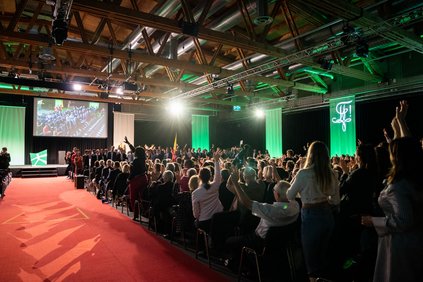Campus - 31.05.2019 - 00:00
Studying in the city
Voting on the proposed new Platztor campus is imminent – and so HSG is moving ever closer to the city centre. Following the relocation of certain institutes, the Student Union has already established a foothold near Blumenbergplatz with its new coworking space. Around a year after opening, the results have so far been overwhelmingly positive. By student reporter Thomas Tarantini.

31 May 2019. The Student Union’s (SHSG) coworking space was officially opened on 14 May 2018. The biggest change so far? Students of the University of St.Gallen now have the opportunity to pursue their studies in the city centre. In addition, the new meeting place offers space for events, a café and a terrace with tea herbs. The history of the 700m2 mini campus begins back in 2016.
Mario Imsand, then president of the SHSG, recalls: "When some institutes moved to Müller-Friedberg Strasse, I heard there was still some further unused vacant space." After discussions with the SHSG’s board, the head of infrastructure at the university, HSG President Thomas Bieger and the Student Council, we were finally able to obtain this space for our students. Mario added that this allowed the SHSG to kill several birds with one stone. The coworking space offers students a closer connection both to the city and to university institutes, temporarily alleviates the problem of lack of space and serves as a useful trial for the newly planned Platztor campus.
Impressive responses and an excess of demand
It is now around a year since the opening of "theCO by SHSG". To date, results have been consistently positive. Yannik Breitenstein, current president of the SHSG, is certainly enthusiastic: "We were able to achieve or even exceed all of our targets! More than 2,000 students have already completed the introduction and can now use the rooms even during off-peak times and on weekends. We have been very impressed by the response so far." In addition, a total of 55 university and student events took place at theCO up to February 2019. Actual demand was higher than originally anticipated. Lecturers also made use of the new location, as a place for interaction and innovative teaching formats. Yannik emphasizes that the SHSG aims to build further bridges to the city in the future. Initial concepts have already been developed with the support of the City of St.Gallen.

#2minutes: Yannik Breitenstein on theCO
The new Coworking Space "theCO" provides cooperative and interdisciplinary working opportunities for students, associations and employees of the HSG in an attractive environment. In particular, it serves as a forum for creative exchange. "theCO" is run by the Student Union of the University of St.Gallen (SHSG). An interview with Yannik Breitenstein, SHSG President 2018/19. (in German)
With theCO, a first step towards studying in the city has already been successfully achieved. An important step. For on 30 June 2019, the citizens of the Canton of St.Gallen will vote on the proposed new HSG Platztor campus. Particularly with regard to this vote, positive experiences from the past provide a good indicator of future success, even if the new campus will not consist only of coworking spaces. The SHSG has encountered much enthusiasm from students about the prospect of studying both in the city and at the Rosenberg site. But why is a new campus needed at all?
Create necessary space and promote lifelong learning
Dr. Bruno Hensler is the HSG’s Director of Administration. About the planned city campus, he says: "On the one hand, the Platztor campus solves the years-old problem of our shortage of space. In addition, it also enables further promotion of St.Gallen as a traditionally strong location for education." At a time when 200 to 300 million is being invested in St.Gallen, 4.5 billion euros are being invested in Zurich and 1 billion euros in Basel in university buildings. "And so it is also important that we are not left behind", explains Hensler. Moreover, the high net added value brought about by education is a calculable and proven fact.
The Platztor campus solves the years-old problem of our shortage of space. In addition, it also enables further promotion of St.Gallen as a traditionally strong location for education.
Dr. Bruno Hensler
HSG’s Director of Administration
The new campus also contributes to integrative learning. "We want to enable both research-related learning and research itself. The HSG must be seen as an overall system consisting of students, research, administration, teaching and executive education. It should therefore support lifelong learning." The Platztor location provides an important piece of this puzzle, alongside theCO for the SHSG and new institute premises in the city. In addition to this aspect, the needs of students have also changed. Today, according to Hensler, they are looking for a destination that combines research and teaching, and infrastructure and life. Students therefore strive for a work-life balance that meets their individual needs, rather than a one-sided offer. For this reason, HSG would also ideally support the construction of student dormitories within the local community.
St.Gallen’s citizens invited to theCO
With around a year’s experience of running a coworking space behind them, the university and the City of St.Gallen have shown themselves to be ready for further cooperation, with the many opportunities this offers. Director of Administration Hensler and representatives of the SHSG all agree that even in the age of digitalization, it is crucial to maintain a local presence that offers ongoing added value. The new campus is an opportunity in many respects – not only for the university, but also for the city. Finally, Yannik says: "The citizens are always welcome to visit and use the coworking space. It is open to everyone. We would be very happy to have such an exchange."
Thomas Tarantini is in the second semester of his Master’s in Business Innovation (MBI) and also studies Business Journalism as part of his curriculum.
More articles from the same category
Discover our special topics











